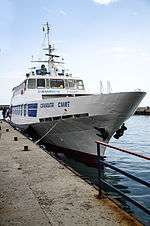Samantha Smith
Samantha Reed Smith (June 29, 1972 – August 25, 1985) was an American schoolgirl, peace activist, and child actress from Manchester, Maine, who became famous during the Cold War between the United States and the Soviet Union. In 1982, Smith wrote a letter to the newly appointed CPSU General Secretary Yuri Andropov, and received a personal reply with a personal invitation to visit the Soviet Union, which she accepted.
Samantha Smith | |
|---|---|
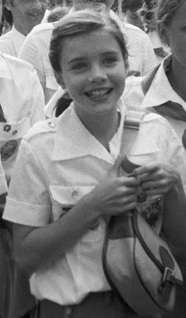 Smith visiting the Artek pioneer camp in July 1983 | |
| Born | Samantha Reed Smith June 29, 1972 |
| Died | August 25, 1985 (aged 13) Auburn, Maine, U.S. |
| Cause of death | Airplane crash |
| Resting place | Ashes buried at Estabrook Cemetery, Aroostook County, Maine |
| Other names | America's Youngest Ambassador; America's Littlest Diplomat; America's Sweetheart[1] (U.S.); The Goodwill Ambassador (USSR) |
| Occupation | Peace activist, child actress |
| Years active | 1982–1985 |
Smith attracted extensive media attention in both countries as a "Goodwill Ambassador", becoming known as America's Youngest Ambassador and subsequently participating in peacemaking activities in Japan.[2] With the assistance of her father Arthur (an academic), she wrote a book about her visit to the Soviet Union, Journey to the Soviet Union, and later became a child actress, hosting a child-orientated special on the 1984 United States presidential election for The Disney Channel and playing a co-starring role in the television series Lime Street, before her death at the age of thirteen on August 25, 1985 in the Bar Harbor Airlines Flight 1808 plane crash.
Historical context
When Yuri Andropov succeeded Leonid Brezhnev as leader of the Soviet Union in November 1982, the mainstream Western newspapers and magazines ran numerous front-page photographs and articles about him. Most coverage was negative and tended to give a perception of a new threat to the stability of the Western world. Andropov had been the Soviet Ambassador to Hungary during the 1956 Hungarian Revolution and the Chairman of the KGB from 1967 to 1982; during his tenure, he was known in the West for crushing the Prague Spring and the brutal suppression of dissidents, such as Andrei Sakharov and Aleksandr Solzhenitsyn. He began his tenure as Soviet leader by strengthening the powers of the KGB, and by suppressing dissidents.[3] According to Vasili Mitrokhin, Andropov saw the struggle for human rights as a part of a wide-ranging imperialist plot to undermine the foundation of the Soviet state.[4] Much international tension surrounded both Soviet and American efforts to develop weapons capable of being launched from satellites in orbit. Both governments had extensive research and development programs to develop such technology. However, both nations were coming under increasing pressure to disband the project. In America, President Ronald Reagan came under pressure from a lobby of U.S. scientists and arms experts, while in Russia the government issued a statement that read, "To prevent the militarization of space is one of the most urgent tasks facing mankind".[5]
During this period, large anti-nuclear protests were taking place across both Europe and North America, while the November 20, 1983, screening of ABC's post-nuclear war dramatization The Day After became one of the most anticipated media events of the decade.[6]
The two superpowers had by this point abandoned their strategy of détente and in response to the Soviet deployment of SS-20s, Reagan moved to deploy cruise and Pershing II missiles to Europe. The Soviet Union's involvement in a war in Afghanistan was in its third year, a matter which was also contributing to international tension. In this atmosphere, on November 22, 1982, Time magazine published an issue with Andropov on the cover. When Smith viewed the edition, she asked her mother: "If people are so afraid of him, why doesn't someone write a letter asking whether he wants to have a war or not?" Her mother replied, "Why don't you?"[7]
Life
Samantha Smith was born on June 29, 1972, in the small town of Houlton, Maine, on the Canada–United States border, to Jane Goshorn[8] and Arthur Smith. At the age of five, she wrote a letter to Queen Elizabeth II in order to express her admiration to the monarch. When Smith had finished second grade in the spring of 1980, the family settled in Manchester, Maine, where she attended Manchester Elementary School. Her father served as an instructor at Ricker College in Houlton[9] before teaching literature and writing at the University of Maine at Augusta[5] while her mother worked as a social worker with the Maine Department of Human Services.
In November 1982, when Smith was 10 years old, she wrote to Soviet leader Yuri Andropov, seeking to understand why the relations between the Soviet Union and the United States were so tense:
Dear Mr. Andropov,
My name is Samantha Smith. I am 10 years old. Congratulations on your new job. I have been worrying about Russia and the United States getting into a nuclear war. Are you going to vote to have a war or not? If you aren't please tell me how you are going to help to not have a war. This question you do not have to answer, but I would like it if you would. Why do you want to conquer the world or at least our country? God made the world for us to share and take care of. Not to fight over or have one group of people own it all. Please lets do what he wanted and have everybody be happy too.
Samantha Smith[10]
Her letter was published in the Soviet newspaper Pravda.[11] Smith was happy to discover that her letter had been published; however, she had not received a reply. She then sent a letter to the Soviet Union's Ambassador to the United States asking if Andropov intended to respond.[12] On April 26, 1983, she received a response from Andropov:
Dear Samantha,
I received your letter, which is like many others that have reached me recently from your country and from other countries around the world.
It seems to me – I can tell by your letter – that you are a courageous and honest girl, resembling Becky, the friend of Tom Sawyer in the famous book of your compatriot Mark Twain. This book is well known and loved in our country by all boys and girls.
You write that you are anxious about whether there will be a nuclear war between our two countries. And you ask are we doing anything so that war will not break out.
Your question is the most important of those that every thinking man can pose. I will reply to you seriously and honestly.
Yes, Samantha, we in the Soviet Union are trying to do everything so that there will not be war on Earth. This is what every Soviet man wants. This is what the great founder of our state, Vladimir Lenin, taught us.
Soviet people well know what a terrible thing war is. Forty-two years ago, Nazi Germany, which strove for supremacy over the whole world, attacked our country, burned and destroyed many thousands of our towns and villages, killed millions of Soviet men, women and children.
In that war, which ended with our victory, we were in alliance with the United States: together we fought for the liberation of many people from the Nazi invaders. I hope that you know about this from your history lessons in school. And today we want very much to live in peace, to trade and cooperate with all our neighbors on this earth — with those far away and those near by. And certainly with such a great country as the United States of America.
In America and in our country there are nuclear weapons — terrible weapons that can kill millions of people in an instant. But we do not want them to be ever used. That's precisely why the Soviet Union solemnly declared throughout the entire world that never will it use nuclear weapons first against any country. In general we propose to discontinue further production of them and to proceed to the abolition of all the stockpiles on Earth.
It seems to me that this is a sufficient answer to your second question: 'Why do you want to wage war against the whole world or at least the United States?' We want nothing of the kind. No one in our country–neither workers, peasants, writers nor doctors, neither grown-ups nor children, nor members of the government–want either a big or 'little' war.
We want peace — there is something that we are occupied with: growing wheat, building and inventing, writing books and flying into space. We want peace for ourselves and for all peoples of the planet. For our children and for you, Samantha.
I invite you, if your parents will let you, to come to our country, the best time being this summer. You will find out about our country, meet with your contemporaries, visit an international children's camp – Artek – on the sea. And see for yourself: in the Soviet Union, everyone is for peace and friendship among peoples.
Thank you for your letter. I wish you all the best in your young life.
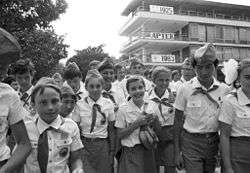
A media circus ensued, with Smith being interviewed by Ted Koppel[15] and Johnny Carson, among others, and with nightly reports by the major American networks. On July 7, 1983, she flew to Moscow with her parents, and spent two weeks as Andropov's guest. During the trip she visited Moscow and Leningrad and spent time in Artek, the main Soviet pioneer camp, in the town of Gurzuf on the Crimean Peninsula. Smith wrote in her book that in Leningrad she and her parents were amazed by the friendliness of the people and by the presents many people made for them. Speaking at a Moscow press conference, she declared that the Russians were "just like us".[16] In Artek, Smith chose to stay with the Soviet children rather than accept the privileged accommodations offered to her. For ease of communication, teachers and children who spoke fluent English were chosen to stay in the building where she was lodged. Smith shared a dormitory with nine other girls, and spent her time there swimming, talking and learning Russian songs and dances. While there, she made many friends, including Natasha Kashirina from Leningrad, a fluent English speaker.
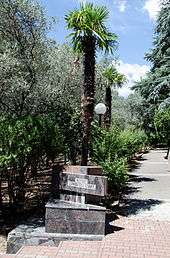
Andropov, however, was unable to meet with her during her visit,[17] although they did speak by telephone. It was later discovered that Andropov had become seriously ill and had withdrawn from the public eye during this time.[18] Smith also received a phone call from Russian cosmonaut Valentina Tereshkova, the first woman to orbit the Earth. However, not realizing with whom she was speaking, Samantha mistakenly hung up after only a brief conversation.[19] Media followed her every step — photographs and articles about her were published by the main Soviet newspapers and magazines throughout her trip and after it. Smith became widely known to Soviet citizens and was well regarded by many of them. In the United States, the event drew suspicion and some regarded it as an "American-style public relations stunt".[20]
Smith's return to the U.S. on July 22, 1983, was celebrated by the people of Maine with roses, a red carpet, and a limousine[21] and her popularity continued to grow in her native country. Some critics at the time remained skeptical, believing Smith was unwittingly serving as an instrument of Soviet propaganda.[21][22] In December 1983, continuing in her role as "America's Youngest Ambassador", she was invited to Japan,[23] where she met with the Prime Minister Yasuhiro Nakasone and attended the Children's International Symposium in Kobe. In her speech at the symposium, she suggested that Soviet and American leaders exchange granddaughters for two weeks every year, arguing that a president "wouldn't want to send a bomb to a country his granddaughter would be visiting".[24] Her trip inspired other exchanges of child goodwill ambassadors,[25] including a visit by the eleven-year-old Soviet child Katya Lycheva to the United States.[26] Later, Smith wrote a book called Journey to the Soviet Union[27] whose cover shows her at Artek,[28] her favorite part of the Soviet trip.[29]
Smith pursued her role as a media celebrity when in 1984, billed as a "Special Correspondent", she hosted a children's special for the Disney Channel entitled Samantha Smith Goes To Washington...Campaign '84.[30][31] The show covered politics, where Smith interviewed several candidates for the 1984 presidential election, including George McGovern and Jesse Jackson. That same year, she guest starred in Charles in Charge as Kim, alongside another celebrity guest star, Julianne McNamara. Her fame resulted in Smith becoming the subject of stalker Robert John Bardo, the man who would later go on to stalk and ultimately murder My Sister Sam actress Rebecca Schaeffer. Bardo traveled to Maine in an attempt to meet Smith, but was stopped by police and returned home.[32]
In 1985, she played the co-starring role of the elder daughter to Robert Wagner's character in the television series, Lime Street.[33][34]
Death
On August 25, 1985, Smith and her father were returning home aboard Bar Harbor Airlines Flight 1808 after filming a segment for Lime Street. While attempting to land at Lewiston-Auburn Regional Airport in Auburn, Maine, the Beechcraft 99 commuter plane struck some trees 4,007 feet (1,221 m) short of the runway and crashed, killing all six passengers and two crew on board.[35] Much speculation regarding the cause of the accident circulated afterwards. Accusations of foul play circulated widely in the Soviet Union.[36][37] An investigation was undertaken in the United States and the official report — which did not show evidence of foul play — was made public. As stated in the report, the accident occurred at about 22:05 EDT, the ground impact point located one mile (1.6 km) south-west of the airport, at 44°02′22″N 70°17′30″W. The report goes on to say, "The relatively steep flight path angle and the attitude (the orientation of the aircraft relative to the horizon, direction of motion etc.) and speed of the airplane at ground impact precluded the occupants from surviving the accident."[38] The main point of the report was that it was a rainy night,[39] that the pilots operating the aircraft were inexperienced, and an accidental, but not uncommon and not usually critical, ground radar failure occurred.
Samantha Smith was mourned by about 1,000 people at her funeral in Augusta, Maine, and was eulogized in Moscow as a champion of peace. Attendees included Robert Wagner and Vladimir Kulagin of the Soviet Embassy in Washington, D.C., who read a personal message of condolence from Mikhail Gorbachev.[40]
Everyone in the Soviet Union who has known Samantha Smith will forever remember the image of the American girl who, like millions of Soviet young men and women, dreamt about peace, and about friendship between the peoples of the United States and the Soviet Union.[41]
President Ronald Reagan sent his condolences to Smith's mother, in writing,
Perhaps you can take some measure of comfort in the knowledge that millions of Americans, indeed millions of people, share the burdens of your grief. They also will cherish and remember Samantha, her smile, her idealism and unaffected sweetness of spirit.[42]
The remains of Samantha and her father were cremated,[43] and their ashes were buried at Estabrook Cemetery, Aroostook County, Maine.
Legacy
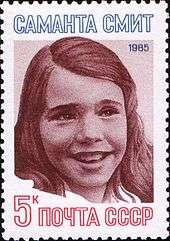
Smith's contributions have been honored with a number of tributes by Russians and by the people of her home state of Maine. A monument to her was built in Moscow; "Samantha Smith Alley" in the Artek Young Pioneer camp was named after her in 1986.[44] The monument built to Smith was stolen by metal thieves in 2003 following the dissolution of the Soviet Union in 1991. In 2003, Voronezh retiree Valentin Vaulin built a monument to her without any support from the government.[45] The Soviet Union issued a commemorative stamp with her likeness. In 1986 Soviet astronomer Lyudmila Chernykh discovered asteroid 3147, which she named 3147 Samantha.[46][47] Danish composer Per Nørgård wrote his 1985 viola concerto "Remembering Child" in memory of Smith.[48] A diamond found in Siberia,[49] a mountain in the former Soviet Union,[50] a cultivar of tulips and of dahlias, and an ocean vessel have been named in Smith's honor.[2] In 1985, a peace garden was established in Michigan along the St. Clair River to commemorate her achievements.[51] In Maine, the first Monday in June of each year is officially designated as Samantha Smith Day by state law.[52] There is a bronze statue of Smith near the Maine State Museum in Augusta, which portrays Smith releasing a dove with a bear cub resting at her feet.[53] The bear cub represents both Maine and Russia. Elementary schools in Sammamish, Washington,[54] and in Jamaica, Queens, New York City,[55] have been named after Samantha. In October 1985, Smith's mother founded The Samantha Smith Foundation,[56] which fostered student exchanges between the United States and the Soviet Union (and, after December 1991, the ex-Soviet successor states) until it became dormant in the mid-1990s.[22] The Foundation was formally dissolved in 2014 after two decades of dormancy.[57]
A 1987 episode of the U.S. sitcom The Golden Girls entitled "Letter to Gorbachev" draws inspiration from Smith's story. In addition, the 1987 film Superman IV: The Quest for Peace included a scene where a boy writes Superman a letter to control the nuclear arms race; according to Christopher Reeve, this scene was also inspired by Smith's story.[58]
In the mid-1980s, after Smith's death, a script was written for a television movie titled The Samantha Smith Story with Robert Wagner as producer.[59] Columbia Pictures Television and R.J. Wagner Productions were reported to have agreed to produce the film for NBC, with Soviet company Sovin Film interested in co-producing it.[60] Ultimately, Columbia Pictures Television decided not to film it due to lack of interest from any network.[61]
Speculation as to what a surviving Samantha might have done in adulthood was dismissed by her mother Jane as unanswerable in 2003, given Samantha was only thirteen when she died and her ambitions had varied from a veterinarian working with animals to a tutu-and-tights-clad ballerina.[62] The notion, which had been put to Samantha herself in the eighties, that she could be President of the United States in adulthood, was dismissed by her in the Disney Channel special that she hosted, with the words "being President is not a job I would like to have".[63]
In 2008, Smith posthumously received the Peace Abbey Courage of Conscience Award for "helping to bring about better understanding between the peoples of the [USA and the USSR], and as a result, reduce the tension between the superpowers that were poised to engage in nuclear war".[64] The Peace Abbey has also proposed The Peace Literature Project in Honor of Samantha Smith "to educate students about peace and promote peace literature for school-age children in 50 selected pilot schools across the United States"[28]
Elliott Holt's 2013 novel You Are One of Them, uses the story of Smith as inspiration for a fictional character, Jennifer Jones.[65]
On the 30th anniversary of the plane crash in 2015, the Maine State Museum opened a new exhibit of materials related to Smith, including photographs of her time at the Artek camp, traditional Russian clothing she was given, and an issue of Soviet Life magazine with her on the cover.[66]
See also
References
- Evening Magazine; WBZ-TV, Boston, 1985
- Saint-André, Yvette Irène. "I Remember Samantha Smith: Goodwill Ambassador". U.S. Embassy in Moscow. Archived from the original on February 19, 2008. Retrieved 2008-02-27.
- Burns, John M. "The Emergence of Yuri Andropov". New York Times, 06-11-1983. Retrieved on 04-01-08.
- Christopher Andrew and Vasili Mitrokhin. "The Mitrokhin Archive: The KGB in Europe and the West". Gardners Books, 2000. ISBN 0-14-028487-7.
- "Pen Pals". Time magazine, May 9, 1983. Retrieved on April 14, 2008.
- Bruce Allyn (19 September 2012). The Edge of Armageddon: Lessons from the Brink. RosettaBooks. p. 10. ISBN 978-0-7953-3073-5.
- "Youngest Ambassador". samanthasmith.info. Retrieved 19 September 2015.
- https://www.hollins.edu/175th-anniversary/distinguished-graduates/jane-goshorn-smith/
- Wright, Bruce (2007–2011) "Ricker College: A Small School in A Big County", Ricker College Trustees. Retrieved on February 6, 2015.
- "The original of Samantha Smith's letter". The Russian State Archive of Contemporary History (RGANI) F. 82 Op. 1 D. 61 L. 8.
- Chazanov, Mathis (1983-04-12). "PRAVDA says it has letters from America". The Philadelphia Inquirer. pp. E16.
- Samantha Smith on ABC Nightline. on YouTube
- "Samantha's Letter". www.SamanthaSmith.Info. Retrieved 2013-05-25.
- Warner, Gale; Shuman, Michael (1987). Citizen diplomats: pathfinders in Soviet-American relations and how you can join them. Continuum. p. 285. ISBN 0826403824.
- Koppel, Ted (2004-12-23). "A Nightline Moment From 1983". Retrieved 2008-02-25.
- Krauthammer, Charles (1983-08-15). "Deep Down, We're All Alike, Right? Wrong". Time. Retrieved 2008-03-08.
- "Andropov Is Too Busy To Meet Maine Girl". The New York Times. 1983-07-21. Retrieved 2008-03-03.
- Smith, William E (1985-02-04). "Soviet Union Sick Leave". Time. Retrieved 2008-03-08.
- "An American girl gets a telephone call from a former cosmonaut". The Philadelphia Inquirer. 1983-07-15. p. A03.
- Moats, Alice-Leone (1983-07-12). "Yes, Samantha, there's a Soviet bear". The Philadelphia Inquirer. p. A11.
- "From Russia back to 'regular things'". The New York Times. 1983-07-23. Retrieved 2008-03-08.
- "Samantha Smith remembered on 20th anniversary of Soviet visit". USA Today.com. 2003-07-14. Retrieved 2008-03-08.
- "Andropov's Pen Pal Is Off to See Japanese". The New York Times. 1983-12-22. Retrieved 2008-03-03.
- "Samantha's address to the Children's Symposium 1983 December 26". samanthasmith.info. Retrieved 2013-05-25.
- Hauss, Charles. "Beyond Confrontation: Transforming the New World Order". Westport, Connecticut: Praeger Publishers, 1996. p. 244. ISBN 0-275-94615-0.
- Garcia, Guy D (1986-03-31). "People". Time. Retrieved 2008-03-08.
- "Results for '0316801763'". Worldcat. 2011. Retrieved 2011-06-07.
- "The Samantha Smith Project". The Peace Abbey Foundation. 1985-08-25. Retrieved 2015-09-18.
- Warner, Gale; Shuman, Michael (1987). Citizen Diplomats. New York: Continuum. p. 286. ISBN 0-8264-0382-4. Retrieved 2011-06-07.
- February 1984 issue, Disney Channel Magazine.
- Samantha Smith Goes to Washington, DC on YouTube
- Snow, Robert L. (1998). Stopping a Stalker: A Cop's Guide to Making the System Work for You. Da Capo Press. p. 72. ISBN 0-306-45785-7. Retrieved 2005-02-25.
- "Samantha, SOV visitor, going on TV". Philadelphia Daily News. 1985-02-25. p. 9.
- Castro, Janice (1985-03-11). "People". Time. Retrieved 2008-03-08.
- "Accident report, 25 AUG 1985". Aviation Safety Network Database. Retrieved 2008-02-25.
- Thomas, Evan (1985-09-09). "The Great War of Words". Time Magazine. Retrieved 2008-02-28.
- "Washington talk: U.S.-Soviet relations; Commonality at an Exhibition". The New York Times. 1987-12-07. Retrieved 2008-02-29.
- Aircraft Accident Report: Bar Harbor Airlines Flight 1808 Beech BE-99, N300WP Auburn-Lewiston Municipal Airport Auburn, Maine August 25, 1985 (PDF). National Transportation Safety Board. 1986-09-30. p. 16. Retrieved 2009-03-22.
- "Pilot Blamed in Samantha Death". The Los Angeles Times. September 30, 1986. Retrieved April 12, 2018.
- "Diplomat, actor attend Samantha Smith's rites". The Sun. San Bernardino, California. Associated Press. August 29, 1985. p. A-14, Col. 1. Retrieved June 17, 2018 – via Newspapers.com.
- "Milestones: Samantha Smith". Time Magazine. 1985-09-09. Retrieved 2008-02-25.
- "History: Samantha Reed Smith". samanthasmith.info. Retrieved 2013-05-25.
- Wallace, David (November 11, 1985). "Still Mourning Samantha Smith, Robert Wagner Decides That His Lime Street Show Must Go on". People magazine.
- "The history of "Artek"" (in Russian). ICC Artek. Archived from the original on 24 March 2015. Retrieved 20 September 2015.
- "Voronezh Retiree Built A Monument to Samantha Smith". Voronezhsky Telegraph (in Russian). Archived from the original on August 21, 2006. Retrieved 2006-06-01.
- Schmadel, Lutz D (2003). Dictionary of Minor Planet Names (5th ed.). New York: Springer Verlag. p. 260. ISBN 3-540-00238-3.
- "Asteroid Named for U.S. Girl". The New York Times. 1986-11-12. Retrieved 2008-02-28.
- John Warnaby (June 1992). "Per Norgaard: Remembering Child for Viola and Orchestra; In between for Cello and Orchestra by Pinchas Zukerman, Morton Zeuthen, Danish Radio Symphony Orchestra, Jorma Panula, Per Norgaard". Tempo. New Ser., No. 181 (Scandinavian Issue): 35+37–38. ISSN 0040-2982. JSTOR 945345.(subscription required)
- "Russians name gem for Samantha Smith". The New York Times. 1985-09-08. Retrieved 2008-02-26.
- "Soviets name mountain after Samantha Smith". The Toronto Star. 1986-10-06. Retrieved 2008-02-28.
- Keefe, William (August 20, 2009). "Port Huron Earns 'Maritime Capital' Title" (PDF). The Beacher. Retrieved 12 July 2020.
- "Samantha Smith Day". Maine law title 1 sec 126. State of Maine. Retrieved 2006-04-11.
- "Samantha Smith Statue". The New York Times. 1985-12-19. Retrieved 2008-02-28.
- "Samantha Smith Elementary School". Samantha Smith Elementary School. Archived from the original on 2009-02-20. Retrieved 2008-02-28.
- "P.S. 182 Samantha Smith". The New York City Department of Education. Retrieved 2008-03-09.
- "Samantha Smith Foundation". The New York Times. 1985-10-06. Retrieved 2008-02-28.
- Bouchard, Kelley (25 August 2015). "Samantha Smith's legacy as America's peace ambassador endures after 30 years". Portland Press Herald. Retrieved 18 September 2015.
- Richard, Julie (1987-06-19). "Reeve Not Happy With Last Film's Promotion". Sun Sentinel. Retrieved 2015-09-18.
- Mann, Roderick (5 July 1986). "Robert Wagner: Reluctant Star In A Very Busy Universe". Los Angeles Times. Retrieved 20 September 2015.
- UPI (20 March 1987). "Columbia Pictures to make TV film based on the life of Samantha Smith". Bangor Daily News. Retrieved 20 September 2015.
- Allen, Mel (May 1988). "Life After Samantha Smith". Yankee Magazine. Retrieved 20 September 2015.
- https://archive.bangordailynews.com/2003/07/14/samantha-smith-visit-to-u-s-s-r-recalled/
- Samantha Smith Goes to Washington, DC on YouTube
- "International Courage of Conscience Award: 1988–2015". The Peace Abbey Foundation. Retrieved 18 September 2015.
- Shipstead, Maggie (2013-05-24). "Cold War, Cooled Heart". Sunday Book Review. New York Times. Retrieved 2013-12-11.
- Edwards, Keith (2015-08-22). "Samantha Smith, Manchester's messenger of peace, to be featured in Maine State Museum exhibit". Kennebec Journal. MaineToday Media. Retrieved 2015-09-01.
Further reading
- Peacock, Margaret. "Samantha Smith in the Land of the Bolsheviks: Peace and the Politics of Childhood in the Late Cold War." Diplomatic History 43.3 (2018): 418-444.
- Smith, Samantha (1985). Journey to the Soviet Union. Boston and Toronto: Little Brown and Co. ISBN 0-316-80176-3.
- Galicich, Anne (1987). Samantha Smith: A Journey for Peace. Minneapolis: Dillon Press. ISBN 0-87518-367-0.
- Matthias Neumann. Children Diplomacy During the Late Cold War: Samantha Smith's Visit of the ‘Evil Empire’ History, Vol. 104, Issue 360 (April 2019): 275-308. ISSN 1468-229X.
External links
![]()
- SamanthaSmith.info – Official site
- SamanthaSmith.info – Official You Tube channel
- A Nightline Moment From 1983 – ABC News, December 2004
- Samantha Smith, This Day in History: August 25
- US Schoolgirl’s Soviet Peace Mission Remembered 30 Years Later
- Contemporary news article pertaining to the death of Samantha Smith
